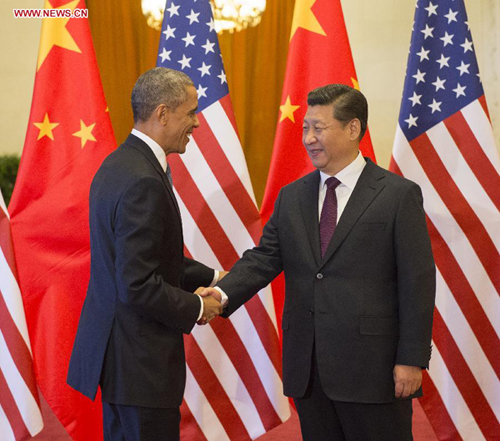|
 |
|
Chinese President Xi Jinping (R) holds a welcoming ceremony for US President Barack Obama at the Great Hall of the People in Beijing, capital of China, Nov 12, 2014. [Photo/Xinhua] |
China face two key challenges in the years ahead. The first is to build a new, global rules-based system with the United States, that supplants the post-WWII order. The second is to consolidate the rule of law within China. The challenge in both cases is to create a stable and fair playing field for all.
The Global Challenge. The post-war period of American-led Globalization 1.0 -- the security, stability and openness of which enabled the rise of China and the other emerging economies – has now given way to Globalization 2.0, an interdependence of plural identities where no one power dominates.
Interdependence, however, does not govern itself, and neither China nor the US can do it alone. America may no longer be the sole superpower, but a post-American order does not mean a “no-America” order anymore than it means China will rule the world as the new hegemon.
For China, America is the indispensable partner, and vice--versa, in reconstructing a stable and inclusive order for the 21st century. If these two top powers do not buy into a global rules-based system that works for all, the world is destined once again to break up into divisive blocs, undermining everyone’s future.
Partnership is easier said than done. When I met President Xi Jinping in Beijing last year along with other members of the Berggruen Institute’s 21st century Council, he raised the peril of the “Thucydides trap” – the historical tendency of rising and established powers to clash as Athens and Sparta did in ancient times.
And unlike the trans-Atlantic order now receding, which was bound together by common cultural and political foundations, the US and China come from very different civilizational roots. A “cross-civilizational” partnership is unprecedented.
The Middle Kingdom has defined itself by its centrality and uniqueness in the world going back millennia; America’s comparatively young identity is associated with universality and the mission of spreading its values. As Henry Kissinger has also noted, China’s geopolitical model, limited historically to East Asia, has always been that of a dominant power surrounded by tributaries. By contrast, the US, following the experience of Europe after the Treaty of Westphalia gave birth to the nation-state, has managed its international relations through seeking a balance of power globally. Kissinger is no doubt right that, in today’s linked world, partnership must be a part of the balance of power in any new geopolitical arrangement. Both sides must trust, but verify.